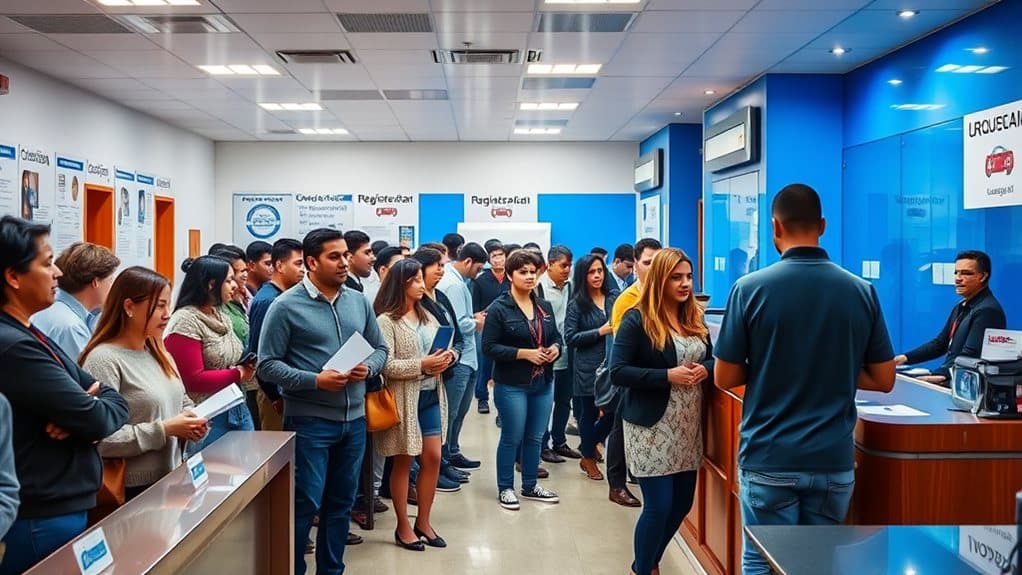They must maneuver through Uruguay's registration process, securing import approval, gathering documents, and paying taxes, to legally drive their car, but that's just the beginning.
Key Takeaways
- Obtain import approval from Uruguayan customs authorities.
- Secure necessary documents for customs clearance and registration.
- Pay required taxes and fees, including import duty and VAT.
- Complete a mandatory vehicle inspection for compliance.
- Finalize registration and obtain Uruguayan license plates.
Vehicle Import Approval and Compliance

Because the process of registering a car in Uruguay can be intricate, ensuring vehicle import approval and compliance is vital, as it lays the foundation for a successful registration, and involves several key steps, including obtaining necessary certification from Uruguayan customs authorities, and verifying that the vehicle meets local standards, such as safety and emissions regulations. The import process is complicated, with compliance challenges, requiring careful navigation of regulations, technical inspections, and potential modifications, to ensure freedom to operate the vehicle, without restrictions or penalties, thereby making it essential to understand and address these challenges proactively. Furthermore, when importing household goods, it is crucial to have the correct documents to avoid customs delays and additional costs.
Required Documents for Customs Clearance
The process of registering a car in Uruguay is heavily dependent on the completion of customs clearance, which, in turn, relies on the submission of a comprehensive set of documents. To maneuver customs documentation, individuals must comply with import regulations, ensuring a smooth transition. Required documents include a bill of lading, original title, and purchase invoice, which establish the vehicle's value and ownership. Customs declaration forms, import forms, and proof of payment for duties and taxes are also necessary, facilitating compliance with Uruguayan import regulations and customs documentation requirements. Understanding the shipping costs is crucial for individuals to factor these expenses into their overall budget for importing a vehicle into Uruguay.
Taxes and Fees for Importing

Having compiled the necessary documents for customs clearance, individuals can now focus on navigating the intricate system of taxes and fees associated with importing a vehicle into Uruguay, where import duties, taxes, and other charges can significantly increase the overall cost of the vehicle, necessitating a thorough understanding of the applicable rates, exemptions, and requirements. Importing a vehicle into Uruguay also requires consideration of customs regulations to avoid any potential issues during the shipping process.
| Tax Type | Rate | Description |
|---|---|---|
| Import Duty | 20% | CIF value |
| VAT | 22% | CIF value |
| Consular Duty | 5% | automobiles |
| Customs Services Duty | 0.2% | maximum USD 50, considering tax exemptions, import regulations. |
Registration Process in Uruguay
Upon navigating the intricate panorama of taxes and fees associated with importing a vehicle into Uruguay, individuals must then investigate the registration process, which, while straightforward, requires meticulous attention to detail. Key considerations include:
- understanding the registration timeline
- arranging vehicle transport
- completing customs clearance
- obtaining necessary documents. The country has seen significant growth in registered vehicles, with a record high of 960,000 units in 2015. A thorough understanding of these factors is essential for a successful registration process, allowing individuals to freely enjoy their vehicle in Uruguay.
Documents Required for Registration

Registration requirements in Uruguay demand meticulous attention to detail, necessitating individuals to gather numerous documents, including proof of ownership, customs clearance, and compliance with local regulations, all of which must be carefully prepared, translated, and legalized, to avoid unnecessary delays or difficulties. Ownership verification is vital, involving a vehicle title and registration, bill of sale, and certificate of conformity. The fee structure for registration is intricate, with various costs associated with each step, making it essential to understand the requirements to manage the process efficiently, ensuring freedom to drive without unnecessary obstacles, and compliance with Uruguayan laws. Additionally, Uruguay's history of license plates, such as the use of Mercosur plates, plays a role in the registration process, affecting how vehicles are identified and categorized within the country.
Additional Requirements and Fees
Generally, individuals attempting to register a car in Uruguay will inevitably encounter a multitude of additional requirements and fees, which often seem to compound exponentially, requiring meticulous attention to detail, patience, and perseverance. Additional compliance, such as
- technical inspections
- adaptation requirements
- compliance certification
- inspection costs, is necessary. Inspection costs, along with other fees, can be substantial, making it essential to understand all requirements. Freedom to drive in Uruguay comes with a price, and individuals must be prepared to meet these demands, navigating the intricate process with determination, to successfully register their vehicle. The tax reform in Uruguay has led to a favorable environment for foreigners, with tax exemptions on foreign-earnings income for the first five years, making it an attractive option for those looking to manage businesses outside the country.
Understanding Import Duties and Taxes

Most individuals attempting to register a car in Uruguay will inevitably encounter a intricate web of import duties and taxes, which can be frustrating to manage, requiring a significant amount of time, effort, and financial resources. The process involves car valuation, which determines the applicable duty rate. Duty exemptions may apply for vehicles from Mercosur member countries or those with Free Trade Agreements. Import duties, Value Added Tax, and Consular Duty are calculated based on the vehicle's CIF value. Understanding these taxes is essential to maneuver the registration process, ensuring freedom to own and operate a vehicle in Uruguay, with careful planning. The calculation of taxes, including the VAT rate, is crucial in determining the total cost of registering a vehicle in Uruguay.
Preparing for Customs Clearance
Numerous individuals attempting to import a vehicle into Uruguay inevitably find themselves entangled in the intricate process of customs clearance, which demands meticulous preparation, significant time, and considerable financial resources. To maneuver through this, key steps include:
- gathering customs documentation
- understanding the clearance timeline
- preparing a commercial invoice
- ensuring a bill of lading. A well-planned clearance timeline is essential, as customs procedures must be started within a specified timeframe, allowing individuals to welcome their freedom with a smoothly registered vehicle. Importers must utilize customs agents to handle the customs clearance process for their vehicle.
Adapting to Local Regulations

How can one possibly steer through the intricate web of regulations in Uruguay without thoroughly understanding the local standards, particularly when it comes to vehicle registration? To achieve freedom of movement, individuals must make necessary local adaptations, including vehicle modifications. This may involve adjusting headlights, emissions systems, or other components to meet Uruguayan standards. Compliance with these regulations is essential, as non-compliant vehicles will not be registered. By understanding and adhering to local regulations, individuals can maneuver the process with ease, ultimately gaining the freedom to drive their vehicle in Uruguay without restrictions, and enjoying the open road. The process of registering a vehicle typically starts at the border, where officials check for TIP completion and other necessary documents before allowing entry into the country.
Obtaining Necessary Certifications
Having adapted to local regulations, individuals can now focus on obtaining the necessary certifications to register their vehicle in Uruguay, a process that requires meticulous attention to detail, patience, and persistence. The certification process involves compliance verification, ensuring vehicles meet Uruguayan standards. Key steps include:
- Vehicle inspection
- Documentation submission
- Payment of fees
- Compliance verification. By following these steps, individuals can maneuver through the certification process, ultimately achieving freedom to drive their vehicle in Uruguay, with the assurance that they have met all requirements, and complied with local regulations, thereby completing the certification process successfully. Vehicles from MERCOSUR member states, such as those from Argentina, must also consider the maximum stay allowed for their vehicles, which can impact the registration process.
Registering Your Vehicle

Registering a vehicle in Uruguay requires the submission of various vehicle papers, including a bill of sale, vehicle title, and customs clearance documentation, which can be a tedious, yet necessary process. The registration fees, comprising import duty, value added tax, and customs processing fees, must also be paid, and these costs can add up quickly, totaling a significant amount, depending on the vehicle's type and value. To successfully register a vehicle, one must carefully gather all the required documents, and pay the corresponding fees, including the annual registration fee, to ensure compliance with Uruguayan regulations, and obtain the necessary registration plates.
Vehicle Papers
As the process of registering a car in Uruguay unfolds, it becomes increasingly clear that obtaining the necessary vehicle papers is a vital step, one that requires attention to detail and a thorough understanding of the requirements. To establish vehicle ownership, several documents are needed, including:
- Vehicle Title
- Registration
- Bill of Sale
- Customs Clearance Documentation. These documents facilitate the registration process, ensuring a smooth transition to Uruguayan license plates and freedom to drive without restrictions, ultimately solidifying one's vehicle ownership through successful completion of the registration process. The registration process in Uruguay can be lengthy and complicated, often involving excessive paperwork and resulting in significant delays, as evidenced by the over three months it took to complete the registration transfer for the second-hand Renault.
Registration Fees
The process of registering a vehicle in Uruguay is fraught with numerous expenses, including various fees that must be paid to complete the registration. Registration fees vary based on the vehicle's type and weight, as of October 2023. Import duty, typically 20% of the vehicle's CIF value, and value added tax, 22% of the CIF value, are also required. Additional fees, such as customs processing and broker fees, may apply, totaling significant costs. These expenses are unavoidable, emphasizing the need for careful planning and budgeting to successfully register a vehicle in Uruguay, ultimately achieving the freedom to drive legally. The corporate bank account setup for companies in Uruguay can be compared to the vehicle registration process, as both require attention to costs and fees to ensure successful completion.
Maintaining Ongoing Compliance
Maintaining ongoing compliance with Uruguayan regulations is essential, requiring vehicle owners to undergo periodic inspections, which may include technical checks, emissions tests, to ensure their vehicles meet safety and environmental standards. Additionally, tax payments, including annual registration fees, must be made punctually, as failure to do so can result in penalties, fines, and additional charges, causing unnecessary hassle and expense. By staying on top of vehicle inspections and tax payments, car owners can avoid common pitfalls, such as delayed registration, fines, and other complications, ultimately saving time and money in the long run. It is also crucial for drivers to be aware of the validity period of their licenses to ensure they are driving legally and safely.
Vehicle Inspections
Vehicle owners face numerous hurdles when navigating Uruguay's registration process, particularly with regards to vehicle inspections, which are mandatory for all imported vehicles to ensure compliance with local safety and emissions regulations, requiring a thorough examination of various components, including lighting, emissions, and other safety features. Mandatory inspections may lead to vehicle modifications. Key aspects include:
- Vehicle condition
- Emissions standards
- Lighting regulations
- Safety equipment. Compliance is essential, as non-compliance can result in fines or penalties, emphasizing the need for careful observance of regulations and potential modifications to achieve freedom of movement in Uruguay. To initiate the registration process, owners must first obtain authorization from the relevant authorities, ensuring they meet the necessary requirements before proceeding with the vehicle inspection.
Tax Payments
Navigating Uruguay's intricate registration process, owners must now focus on tax payments, a vital aspect of maintaining ongoing compliance, after addressing the mandatory vehicle inspections that can lead to costly modifications. Tax payments include import duty, value added tax, and customs processing fees, totaling over 100% of the vehicle's new value for non-Mercosur imports. Owners should investigate tax exemptions, and engage in careful tax planning, to minimize their burden, ensuring freedom to manage their finances effectively, and maintain compliance with Uruguayan regulations, ultimately achieving a successful registration process. Keeping accurate documentation is essential for corporate deductions to ensure that owners can claim the correct expenses and minimize their tax liabilities.
Finalizing Registration and Obtaining Plates

Registering a car in Uruguay is a complicated process that requires careful attention to detail, and finalizing registration and obtaining plates is the last hurdle to overcome. To achieve registration confirmation, one must complete several steps, including finalizing plates. The process involves:
- Obtaining import approval
- Paying registration fees
- Completing vehicle inspection
- Receiving customs clearance documentation. After completing these steps, individuals can obtain Uruguayan license plates, securing their freedom to drive, finalizing registration, and obtaining plates, thus concluding the process, and allowing them to enjoy their newfound freedom on the road.




10 Responses
Why does it have to be so complicated? I just want to drive my car without jumping through hoops!
Seems excessive. Other countries manage vehicle registration much easier.
If you ask me, they should simplify these rules. It’s just too much for ordinary people.
‘Complicated’ is an understatement! Why can’t they streamline this?
This process sounds like a nightmare. Who has time for all this paperwork?
‘Compliance challenges’? Sounds more like a full-time job than registering a car.
‘Freedom to drive’? More like ‘freedom to drown in paperwork’! What a joke!
I can’t believe how many fees there are! It’s like they want to make it impossible.
‘Necessary certifications’? Sounds more like unnecessary headaches!
‘Technical inspections’ and ‘adaptation requirements’? This is why I’m sticking to public transport.